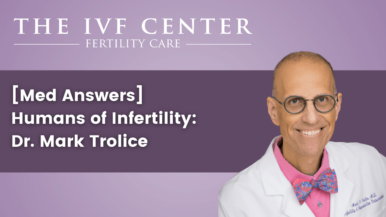There is little more devastating to future parents than a miscarriage, the loss of a pregnancy during the first 20 weeks. Miscarriages affect about 15% of women at some point in their lifetime. Of all diagnosed conceptions, approximately 50% do not continue before they even implant in the uterine cavity. Most first trimester miscarriages are caused by random chromosomal errors that occur in the first stages of growth. Other frequent causes of miscarriage include: an inheritable genetic problem in the male or female; a uterine anatomic abnormality; a hormonal disorder; and an autoimmune disorder. Although a fetal heartbeat after 8 weeks is reassuring, RPL patients are still at higher risks of miscarriage than the general population. Therefore, an extensive evaluation and comprehensive treatment plan are crucial to a successful outcome.
Miscarriage is usually a random event, not a sign of an ongoing reproductive problem. If you have had one miscarriage, your chances for future successful pregnancies are good.
Risk factors for pregnancy loss include:
- Increasing age. The frequency of miscarriages of diagnosed pregnancies ranges from 12% among women younger than age 20 to about 26% among women over age 40.
- Your or family history of recurrent miscarriage
- Cigarette smoking
- Cocaine use
- Exposure to certain chemicals
- High caffeine use
- Polycystic ovary syndrome
- A poorly controlled chronic disease (such as diabetes)
- Some bacterial and viral infections during pregnancy
- Problems with the structure of the uterus (such as a T-shaped uterus). Between 12% and 15% of women who have recurrent miscarriages have problems with the structure of the uterus.
- A previous child with abnormalities or defects
- Antiphospholipid syndrome. An immunologic cause, or the woman’s immune system rejecting the pregnancy, plays a part in a small number of miscarriages. (Some immunologic treatment, however, has not proven to be effective and in some cases can increase the risk of miscarriage.)
Miscarriage is not caused by:
- The mother’s emotional state or a sudden fright
- Sexual intercourse
- Exercise
- Working or lifting heavy objects
- A fall or blow to the abdomen, unless severe
- Diet. There is no conclusive evidence that a diet moderately lacking in nutrients causes miscarriage. Also, the nausea and vomiting (morning sickness) of early pregnancy do not cause miscarriage.
- Exposure to computer monitors
- The use of electric blankets or heated water beds
We are Central Florida’s most successful IVF Program.






